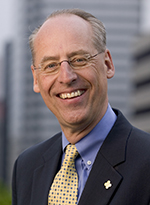 by Wim Wiewel, President, Portland State University
by Wim Wiewel, President, Portland State University
(This column first ran in the Portland Business Journal)
As president of Portland State University, my role is to provide the very best educational opportunities and ensure our graduates are ready for the 21st century workforce. That means exposing students to the key ideas, problems and solutions they will face after they graduate – an obligation we take seriously at PSU. I believe, as do nearly 700 of my colleagues who have signed the American College & University Presidents’ Climate Commitment, that a focus on sustainability is critical to that preparation.
Yes, it’s a buzzword that rankles some people. What we have found at PSU, however, is that our students learn to analyze problems from multiple points of view – economic, social, technological, environmental. They become better thinkers and ultimately better global, and local, citizens.
Think of some of the bigger debates swirling around Oregon today: Should we allow coal trains to travel through the Columbia Gorge for eventual export to China? Should we build a liquid natural gas facility on the coast? The sustainability lens on these matters doesn’t reduce them to the binary good/bad, yes/no arguments that we hear so frequently. Instead, we apply systems thinking, which takes into account many other variables: Would it be better for the world if China burned cleaner U.S. coal? Would a natural gas facility produce jobs and serve as a bridge to reducing global carbon emissions?
When students tackle those difficult questions, they develop skills in determining complex trade-offs, in weighing long-term and short-term costs and benefits, and in devising creative and often low-cost solutions.
I mentioned above my affiliation with the ACUPCC – the Climate Commitment group. This is a voluntary effort by nearly 700 higher education campuses – from community colleges to research universities – to reach carbon neutrality. I serve as chairman, in part because of my deep belief that climate change is one of the most critical issues of our time. At PSU, we’re walking the talk as much as possible, from the small things like hydration stations that reduce the use of plastic water bottles, to construction of multi-million dollar LEED buildings that rely on natural light, reuse of rainwater and other energy-saving innovations.
PSU also is home to the Institute for Sustainable Solutions – command central for most of our sustainability efforts. The center works with PSU faculty to include sustainable concepts in student curriculum, with researchers and with partners in the Portland community. One of our key partnerships is with Portland General Electric, which is helping put PSU on the forefront of electric vehicle research. We devote an entire block on campus to electric car recharging stations. This being Portland, they receive heavy use.
At PSU, we require most students to get out in the community and learn by doing, which might include helping plan the best transportation systems in a rapidly changing neighborhood, or helping a local grocery chain reduce waste to near zero.
In short, sustainability as a term may be overexposed, but as an intellectual pursuit it offers experiential learning for real problems and projects. Of course, I don’t suggest that most – or even many – students pursue sustainability science as their formal degree. Most careers need in-depth knowledge in other areas. I am a firm believer, however, that a focus on sustainability drives our students to learn and innovate in ways that will help meet the challenges of the 21st century.

Add new comment